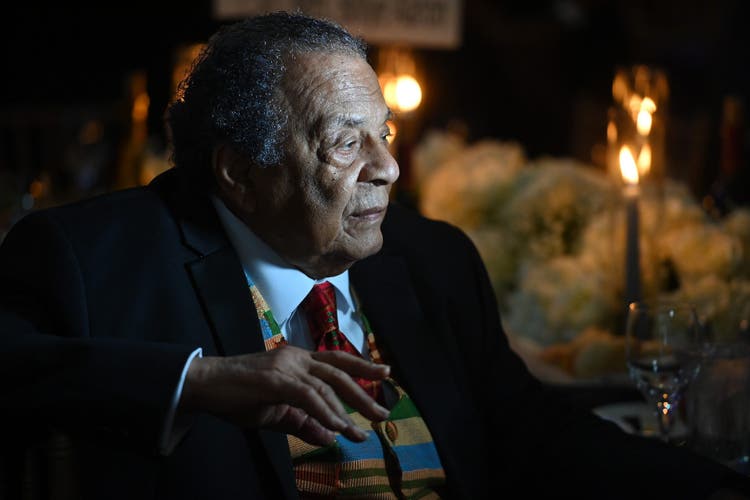
Ambassador Andrew Young has a storied career in activism, politics, and diplomacy. The New Orleans native is so aware of his reputation that he even named his 1998 autobiography, “An Easy Burden: The Civil Rights Movement and the Transformation of America.” In this week’s episode of “Love and Respect with Killer Mike,” the civil rights leader, former ambassador, and heavily awarded civil servant talks to Killer Mike about Malcolm X, Dr. Martin Luther King, a career of service, and how he’s managed to stay calm under pressure for over 60 years.
Born to a school teacher and a dentist in heavily segregated 1930s New Orleans, even at a young age, the future pastor and politician realized he had to learn to practice diplomacy. He shares, “Growing up between an Irish grocery store and an Italian bar, I think I was destined to be an ambassador… I had to negotiate every day to keep from getting my a** kicked just to get the grocery store.” Racial tensions at the time were exacerbated for middle-class Black families like the Youngs family as they tried to navigate segregation and anti-Blackness.
After completing his undergrad degree at Howard University, the Hartford Seminary graduate moved his family to Montgomery, where he encouraged Black Alabama citizens to vote — even under the threat of violence. It was during this time that the member of Alpha Phi Alpha Fraternity first encountered another brother who would change the course of his life: Martin Luther King, Jr. Little did he know, a career move to New York City would put him square in the pathway of another civil rights leader: Malcolm X.
Perhaps one of the few living people who knew both Malcolm X and MLK, the former executive director of the Southern Christian Leadership Conference (SCLC) expressed that the pair were more similar than modern discourse would have us believe. He says, “People [have] caricatured them. They wanted to make Malcolm one thing, and Martin another. They were probably much closer as brothers.” While it’s common to paint Malcolm X as the more militant and forceful character to MLK’s “softer” non-violent approach, Ambassador Andrew Young disagrees. He says, “I think some of Martin’s speeches are far more militant, [such as] his speech at Riverside Church against the war in Vietnam. He faced up to the fact that he was ashamed, but America was the most violent force on earth.”
Even though two of the most famous historical figures in modern history worked toward the same cause, ultimately, the Presidential Medal of Freedom winner says that they both understood how the public perceived them. Young continues, “When MLK won the Nobel Peace Prize, Malcolm X came to the back of the armory to meet him…he told Martin, ‘I support you and everything you do, but it’s best we’re not seen together.’” Portrayed in the media as an extremist and anti-American, Malcolm X worried an association would negatively impact MLK’s relationships in politics and the media. However, the Young remembers Malcolm X much differently than his public image. He says, “I never saw Malcolm hate anybody. He spoke with authority like Martin did. You would think it was a prophet from the top of Mount Olympus…but at the dinner table, he barely spoke above a whisper.”
During the time of change that would produce both Malcolm X and Martin Luther King, Jr. as civil rights leaders, Ambassador Andrew Young went from a young pastor to a re-occurring role on an Emmy-award winning CBS show to a key strategist in civil rights campaigns in Selma, Birmingham, St. Augustine, and Atlanta. And that wasn’t nearly the end of his career. After his work with the SCLC ended, Young served two terms in US Congress and became the first African American to hold the position of United States Ambassador to the United Nations. Throughout his amazing career, the father of four has maintained that love and respect are what contributed to his success in diplomacy, activism, and politics. He says, “Just because you’re good and decent and want to be righteous doesn’t mean you don’t have a pot boiling inside of you… Strength is in your mind and in the love and forgiveness and respect that’s in your heart.”
From a small age, Ambassador Andrew Young understood that there is strength in diplomacy and power in forgiveness. He recalls watching a film with his father about American track and field icon Jesse Owens during his historic 1936 Olympic run, specifically when Adolph Hitler refused to award the record-breaking sprinter the medal for the 100M sprint. Rather than allowing the racist gesture to bother him, Owens continued his races. This had a profound impact on Young. He says, “That wasn’t Jesse’s problem, his problem was he had three more races to run… Hitler got mad, but Jesse went on to win three more medals.” Perhaps this is where the elder statesman learned that a calm hand accomplishes more than a heavy fist. After decades of service, nobody would know better than Andrew Young.